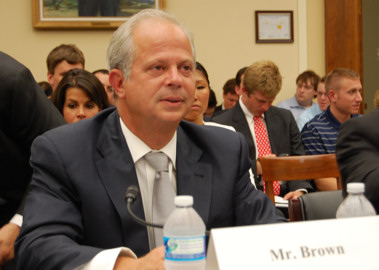Congress should revise the Renewable Fuels Standard (RFS) to ensure that food producers are not starved for corn by the increasing demand from the ethanol industry, the National Chicken Council told a congressional committee yesterday.
“The RFS needs to be subject to an adjustment when market forces and the corn harvest are such that all market needs cannot be met at a reasonable cost to users,” NCC President Mike Brown said in testimony yesterday to the Energy and Environmental Subcommittee of House Committee on Science, Space, and Technology. “We support proposed legislation to permit individual states to opt out of the corn ethanol portion of the RFS. States could determine for themselves the trade-off of higher food costs versus more gasoline blended with ethanol.”
“Allowing states to make this critical call is a step toward taxpayers and consumers better deciding for themselves what is in their best interest,” Brown said. “The policies and rules of the games for corn-based ethanol must be re-balanced and the playing field must be leveled to permit chicken producers and other animal agriculture producers to more fairly compete for the very limited supplies of corn this year and most likely for the next few years,” he said.
He said such a modification would be a true compromise in the RFS, more so than the legislation that has been floated to phase out the Volumetric Ethanol Excise Tax Credit (VEETC), or blenders’ credit, while granting the ethanol industry new subsidies for so-called ethanol “infrastructure,” such as blender pumps and storage facilities.
“Compromise means that the ethanol industry needs to allow for a good measure of flexibility in the ethanol policy and program going forward,” Brown said. “Dressing-up ethanol policy in another dress is not a compromise.”
Brown praised the 283 members of the House who voted last month to stop USDA from allocating funds for ethanol “infrastructure” and the 73 members of the Senate who voted in favor of an immediate end to the blenders’ credit, which helps prop up the ethanol industry.
“The message is becoming increasingly clear that more and more in Congress are recognizing that the ethanol industry must, after more than 30 years, begin to compete on a level field in the marketplace,” he said.
Brown also voiced dismay at the decision by the Environmental Protection Agency to legalize the sale of gasoline with as much as 15 percent ethanol content. Currently the level of ethanol in gasoline is limited to 10 percent except for a high-level blend of 85 percent ethanol and 15 percent gasoline sold at a few service stations.
“The National Chicken Council cannot understand why the federal government is taking this untimely and unfortunate step to put more pressure on an already precarious corn crop this Fall,” Brown said. “A misguided ethanol policy is being further misguided by the rush to placate the corn ethanol interests. When will the Administration begin to recognize that blindly pursuing this type of policy is financially damaging consumer pocketbooks and causing taxpayers to pay for a policy that makes little, if any, economic sense?”
Brown called for a study by the National Academy of Sciences to assess the ramifications of the use of mid-level ethanol blends, meaning any blend level above E-10.
“Chicken companies and all of animal agriculture are bearing the burden and feeling the disastrous effects of competing for corn on a field that is heavily tilted toward the ethanol industry,” Brown said, noting that some companies have been forced to limit production and lay off workers due to the high cost of corn. He said financial distress in the industry would continue as long as corn prices remain high.
“NCC urges this Committee and others in Congress to move quickly to approve the draft legislation for an impartial, science-based study,” Brown said. “Such a study will help document the folly of hiking the ethanol blend in question when there is not enough corn in the foreseeable future to even meet the needs of E10.”
The RFS currently requires a fixed amount of ethanol to be added to motor gasoline. The quota for 2011 is 12.6 billion gallons of ethanol, an amount that will rise every year until it tops out at 15 billion gallons in 2016. Nearly all ethanol in this country is derived from corn. Nearly 40 percent of this year’s corn crop will be devoted to ethanol production, driving the price of corn to over $7 per bushel, far above its cost when ethanol demand took hold. Corn is the largest component in chicken feed and the largest part of the cost of producing a live chicken.


